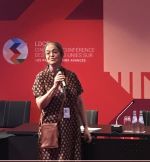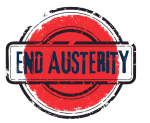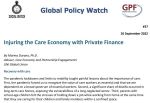Social Watch news
Published on Mon, 2023-06-05 12:18
By Roberto Bissio*
A reform in the international financial architecture is needed and urgent. High level UN officials and civil society agreed on that proposition during the UN Summit on the Least Developed Countries.
“The international financial architecture is absolutely no longer fit for purpose. It is morally bankrupt” said UN deputy secretary general Amina Mohammed in a candid dialogue with civil society organizations at the closure of the Civil Society Forum on the last day of the Summit on the Least Developed Countries held in Doha last March 2023.
|
Published on Thu, 2022-12-15 14:48
Social Watch Philippines (SWP) - Alternative Budget Initiative Health Cluster (SWP - ABI) held a three-day capacity-building workshop on budget and policy advocacy and campaigns for water, sanitation, and hygiene at Hive Hotel and Convention Center, Quezon City on November 23-25, 2022. The activity was also accessible online via Zoom. The workshop training was participated by civil society organizations working on health, environment, and human rights, and those representing persons/children with disability, older persons, and urban poor communities.
|
Published on Tue, 2022-11-15 19:29
The UN established the category of least developed countries (LDCs) in 1971, as many developing countries were navigating a path to development in the post-colonial period. The classification identified specific development challenges faced by these countries.
|
Published on Thu, 2022-11-03 18:40
This GPW Round Up #3, CSO Participation at the UN: Perspectives on CSO Engagement in UN Processes, highlights some insights, analyses, commentary and advocacy regarding civil society organizations engaging in UN multilateral processses. From the Member States to the UN Secretary-General, CSOs are frequently exalted as an integral part of multilateral policy-making processes; yet, whether their calls and analyses are genuinely heeded is up for debate. Some Member States and CSOs have called for improvements in CSO participation, supported by recommendations from experts on reforms to CSO engagement.
|
Published on Tue, 2022-11-01 11:22
In September 2022, heads of state and government spoke at the UN Headquarters on the theme “A watershed moment: transformative solutions to interlocking challenges”.
Secretary-General António Guterres’s message was clear: “Our world is in peril and paralyzed". He launched the High-level General Debate bluntly: “Our world is in big trouble. Divides are growing deeper. Inequalities are growing wider. Challenges are spreading farther.” He urged, “We need action across the board.”
|
Published on Thu, 2022-09-29 00:00
The video of the session The event End Austerity Now! is now available.
85% of the world’s population is expected to be under some sort of austerity measures in 2023, according to analysis of IMF projections. But austerity cuts are not inevitable and alternatives exist. In this event, some of the world’s leading experts provided short, powerful and inspiring statements on why we need to end austerity now.
|
Published on Mon, 2022-09-26 15:38
Recovery with care
The pandemic lockdowns and limits to mobility taught painful lessons about the importance of care. First, the pandemic forced us to recognize the value of care workers as essential and that we are dependent on a broad spectrum of essential workers. Second, a significant share of deaths occurred in long-term care homes, exposing the vulnerabilities of a long-neglected sector. Third, parents with school-age children felt the stresses of holding down a job while working from home at the same time that they are caring for their children and family members within a confined space.
|
Published on Fri, 2022-09-16 17:55
Crucial to the achievement of the Sustainable Development Goals (SDGs) of the 2030 Agenda is SDG 17, “Strengthen the means of implementation and revitalize the Global Partnership for Sustainable Development”. Increasingly, discussions now take the form of multistakeholder partnerships and engagement with the business sector as a tool to mobilize finance for the SDGs or generate needed capacity - often to develop a pipeline of bankable projects. This partnership orientation has become a regular feature of the UN agenda, from the Economic and Social Council (ECOSOC) Operational Activities Segment in May 2022 to the High-Level Political Forum (HLPF) in July 2022.
|
SUSCRIBE TO OUR NEWSLETTER
Submit

|








